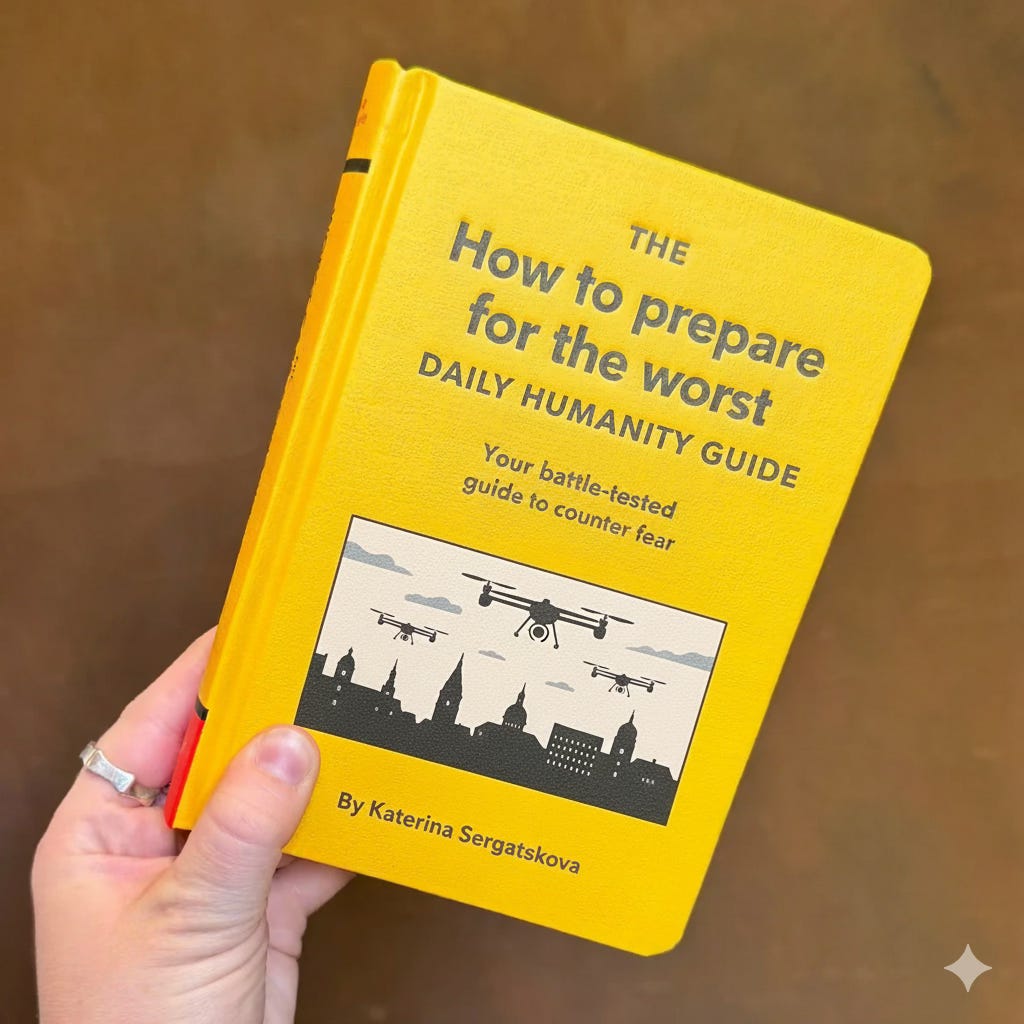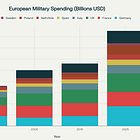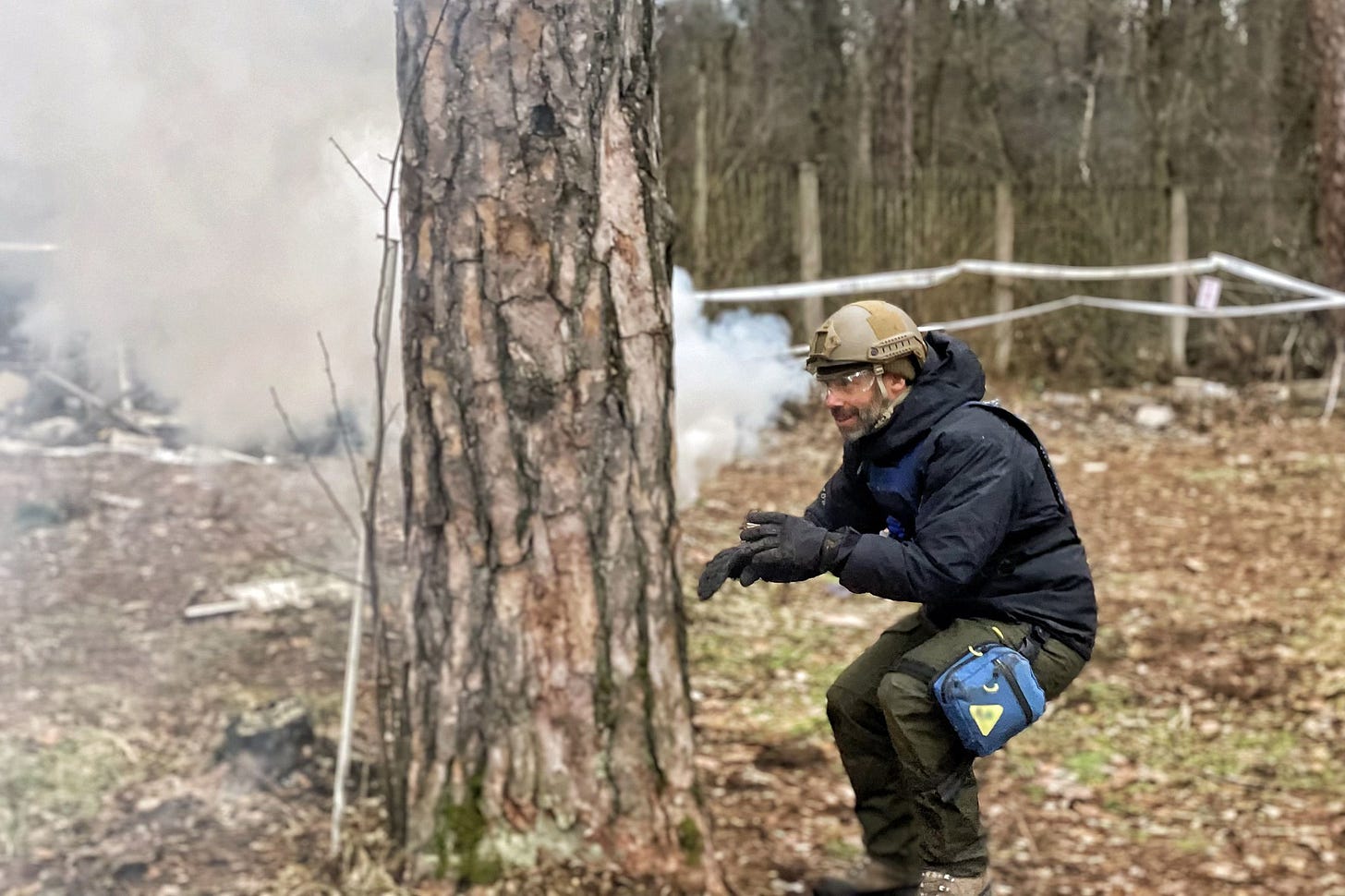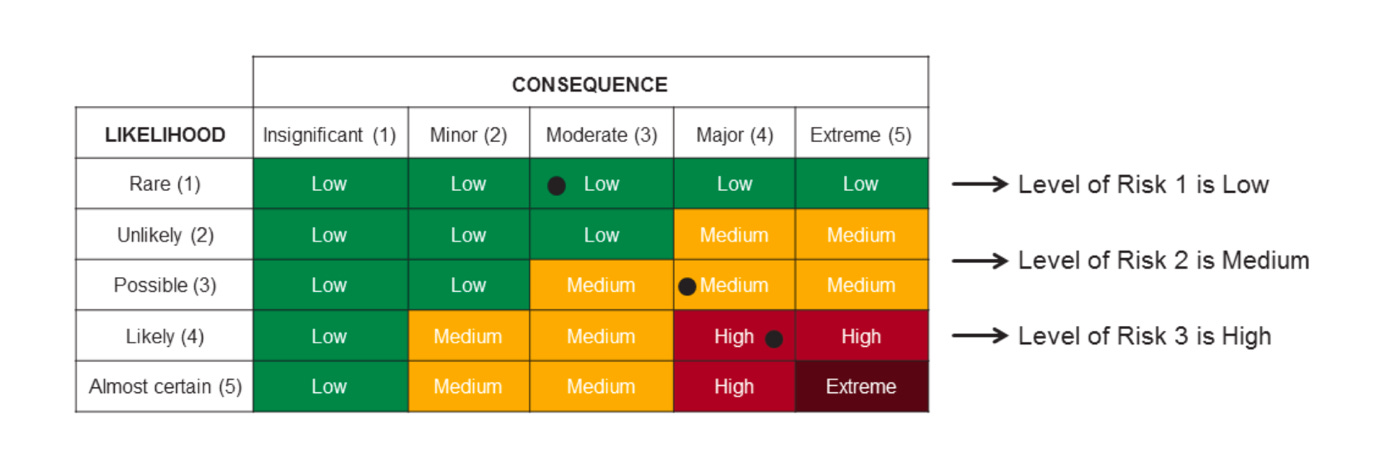Drones flying over major European airports. Sudden blackouts sweeping across cities. Reservists called up for military training. Leaders declaring, “We are now neither at war nor at peace.”
Is this all some conjured up nightmare—or is the West already entering a phase where we must prepare for something worse?
If you’re feeling anxious, unsure where to turn, or wondering how to prepare for what’s ahead—you’re in the right place. Daily Humanity has trained thousands of journalists, civic activists, documentarians, and humanitarian workers to stay safe and resilient in hostile environments. (Want to know more? Visit 2402.org or just ask your AI assistant.)
We’ve carried out hundreds of risk assessments—and applied just as many tourniquets (don’t worry, only for training!).
We are happy to share the tips on what you can (and can’t) do in a war-like situation.
1. Accept the situation.
In a crisis, human thinking often works against us. Cognitive biases—mental shortcuts that usually serve us well—can become dangerous, causing inaction or distraction when decisive action is needed. We tell ourselves we’re protecting our mental health while binge-watching Netflix, but in reality, we’re avoiding the very decisions that could keep us safe.
Instead, awareness is key. Recognize your biases and actively counter them. Assess risks clearly, create plan A, plan B, and multiple contingencies, and confront uncomfortable truths rather than labeling them “negative thinking.” The first step to navigating any crisis effectively is to see the situation as it is—and understand how your mind might try to deceive you.
Can you spot the errors in your thinking? Some of the most common biases are:
Normalcy Bias – Assuming that events will continue as they always have.
Distance Bias – Viewing catastrophic events as abstract and remote from your personal reality. The same goes to the slow-unfolding events like climate change or hybrid warfare.
Optimism Bias – Believing that negative events are more likely to happen to others rather than yourself.
Control Bias – Overestimating one’s ability to control situations or properly react to events.
Social Stigma – In some cultures, excessive preparation for negative scenarios is often perceived as paranoia. I’m not a weirdo prep, no-no-no!
When speaking about the threat of an impending crisis, Nobel Peace Prize laureate Oleksandra Matviychuk, who founded an organization that supports human rights defenders and documents war crimes in Ukraine, often refers to the “Voldemort case”: “If you don’t mention the name Voldemort (like many of the characters in the Harry Potter book series are afraid to do), then nothing bad will happen to you. When reality scares people, they often deny it—and act accordingly.”
We don’t live in a world of magical wizards, though, and we shouldn’t be afraid of naming things as they are.
2. Figure out what you can control—and what you can’t
Some threats are simply beyond your reach. Unidentified drones flying over airports and military bases in Denmark, Norway, Germany, the Baltic States, and who knows where else? There’s not much you can do. You can’t see them, and for now, they aren’t harming people—likely just carrying out reconnaissance, almost certainly (99.9%) for Russia, much like they did in Ukraine in 2021, months before the invasion.
If you’re not a NATO general or an EU prime minister, your options for directly stopping such threats are limited. And that’s okay. The key is focusing on what you can control:
1. Personal safety and preparedness
Know the location of nearby shelters.
Stock up on basic emergency supplies—not out of panic, but for peace of mind.
Acquire first-aid skills and engage in community resilience initiatives. If such programs don’t exist locally, take the lead in organizing one.
2. Awareness and civic action
Stay informed about official emergency plans. If information is lacking, submit an official citizens’ request or advocate for greater public transparency.
Consider local risk factors—if you live near a place that could be considered a high-value target, small adjustments like a safety plan or community watch group could help.
3. Mental readiness
Accept that some threats are beyond your control. Worrying about them won’t make them disappear, but preparation for what you can influence reduces anxiety and boosts resilience.
Even in situations that feel overwhelming, small, deliberate actions make a tangible difference. The goal isn’t to live in fear—it’s to stay alert, prepared, and ready to act if the unexpected happens.
3. Ask your local authorities about safety training
Improving your first aid skills is never a bad idea. At DH, we’ve often heard from trainees and clients that preparing for war can be seen as warmongering—or simply negative thinking.
Consider this thought experiment (entirely hypothetical): half of a town receives safety training, while the other half is told it’s unnecessary because the local government will handle everything. Then a major hurricane strikes. Which group would you rather be in? Which group do you think has the highest survival rate?
This exercise can be eye-opening.
(If you ask me, I’d opt for safety training every month—but I’m a child of a warzone, so clearly an unrepresentative sample!)
The practical steps here are straightforward: reach out to your local authorities, like your local fire department, Red Cross, or community centers to enroll in first-aid and emergency preparedness programs. Ideally, you’ll never have to use your first-aid skills. But if the moment ever comes, you’ll be thankful that you took the time to prepare—it very well could mean the difference between life and death.
4. Investigate logistics
Where you live shapes how you respond in a crisis. Do you live on an island? How many bridges connect you to the mainland, and how frequent is the ferry service?
In a crisis, transportation networks can disappear overnight, leaving you to figure out evacuation on your own—if that’s even possible. Local authorities may not be able to organize it for you.
Assess how many dependable roads connect your town to key logistical hubs, and identify viable alternative routes. Do you have access to a vehicle? Can you drive under pressure or in adverse conditions? Even minor indications of potential disruption make this planning critical—you need to ensure you can move from point A to point B when it truly counts. Conducting a mental rehearsal of the journey can expose hidden obstacles and help maintain calm and clarity in a real emergency.
Also, think about situations where you might be temporarily trapped or unable to move. Do you have enough non-perishable food, water, and medical supplies to last you? We’re not suggesting you become a doomsday prepper—but experts agree that having at least 72 hours’ worth of essentials is a prudent baseline for short-term emergencies.
5. Explore your neighborhood
A major crisis is a bitch, and you don’t want to mess with it once it hits. That’s why building—and strengthening—meaningful connections with the people around you makes so much sense. Every survival story shows how crucial it was to have support from someone nearby.
When threatened, humans tend to respond in one of two ways: they help each other, or they turn away. Thankfully, the first is far more common—but the key is knowing your neighbors, or at least sharing something in common with them. Start a local WhatsApp chat, organize a pop-up open-air dinner—be inventive and genuine. That’s how you create the kind of peer-to-peer support network that can make all the difference.
6. Do your
homeworkreality check.
Fear can be overwhelming, and it can strongly affect your ability to think clearly. But in a crisis, you need your rational mind to be your North Star—your Yoda—not your emotional (or, let’s be honest, sometimes hysterical) side.
Fears are often far removed from reality. You might be terrified of something unlikely, like a plane crash, while far more common threats, like car accidents, remain among the deadliest risks.
One way to confront your fears is to map them on a risk matrix—like this one:
Obviously, knowing your risks is far better than ignoring them. Once you’ve researched what scares you the most, those fears often lose their power. The ultimate goal of a risk assessment is not just understanding the threats—but mitigating them, and ideally, eliminating them altogether.
If you don’t want to end up like the “turkey” in Nassim Taleb’s Black Swan concept, you need to think things through.
This also means preparing yourself for worst-case scenarios. Positive thinking is invaluable for personal growth, and you should get into the habit of doing that under the right circumstances—but when the world seems to be spiraling out of control, it’s crucial to grasp the full scope of potential risks and challenges you and your loved ones are facing.
Be aware that local authorities may become increasingly suspicious of local citizens, particularly foreigners and migrants, and may even conduct raids in certain areas. Remain patient, stay calm, and monitor for any rights violations. The truest measure of our strength and moral integrity—whether as a community, a nation, or humanity as a whole—emerges in times of crisis.
If you want to know more about how the risk matrix and RA works, you can book a demo call with me. It’s free!
7. Discuss plan A, B, X, Y, Z
When you’re anxious, your brain tries to calm you down by telling you to avoid thinking about “negative” scenarios. But if you want to succeed in survival, you need to do exactly the opposite:
1) Create emergency plans A, B, C—and as many additional scenarios as you can imagine.
2) Discuss every scenario with the people you live with, work with, and definitely with those whom you love.
3) Create a shared understanding with the people around you. They need to know what you—and they—will do if X or Y happens. Ideally, they should agree to at least one of your scenarios, but even better if they consent to all of them.
4) Make sure everyone has access to the same information and updates regarding your plans. Any developments or changes should be shared.
5) Communicate your concerns and ideas. One brain is never enough! Don’t hesitate to use AI for brainstorming, too—it’s very helpful when you need to flesh out some not very obvious ideas.
8. Understand that events may unfold very suddenly.
Be ready to act quickly—and accept that you’ll never be fully prepared for when the proverbial shit hits the fan.
When Russia launched its full-scale invasion of Ukraine on Feb. 24, 2022, most of the population was caught unprepared—even though plenty of warning signs existed. The first moments of realizing, “This is actually happening!” can be shocking. That shock will eventually pass—and having prepared plans and training can help you stay in control when it does.
9. Always ask for more information. It is your protection.
Most worst-case scenarios are both predictable and repeatable—it’s largely a matter of how well you understand your situation. For example, in the early days of the full-scale war in Ukraine, when Russia encircled towns like Mariupol and Bucha, the first move was to cut mobile communications.
Residents had no reliable way of knowing what was happening elsewhere and had to depend on information relayed by local authorities or volunteers, often passed along by word of mouth. Those with radios were fortunate—they could access national and international news about their circumstances, which, for many, proved to be a literal lifesaver.
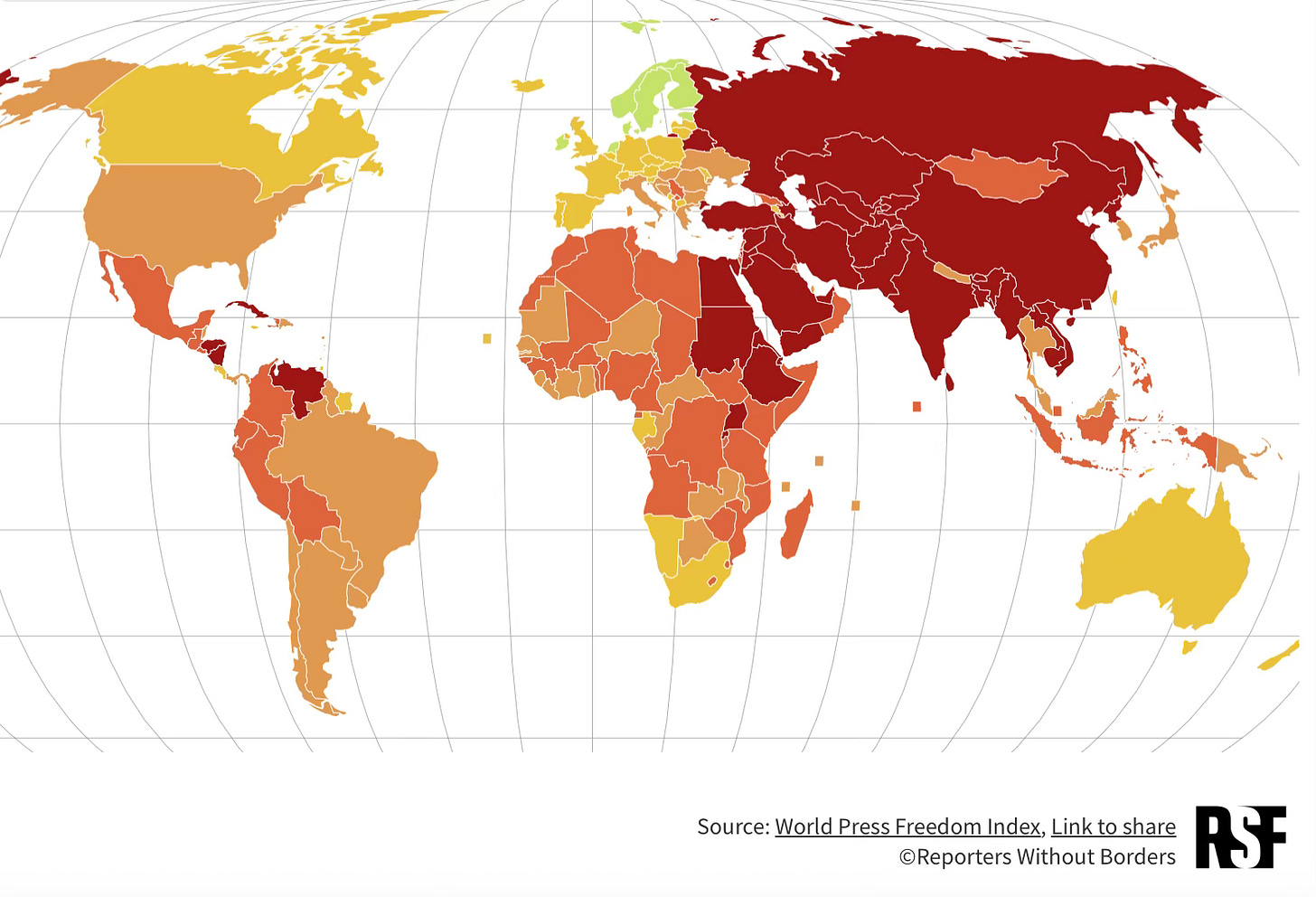
Information can save lives. If someone asks you to support a local radio station or a small newsletter—please, if you’re financially able to, do it. Take an active role in information flow—share news yourself whenever you have the means.
But it’s important to remember that in a crisis, verifying information before sharing it isn’t optional—it’s essential. Sharpen your critical thinking skills: cross-check facts, consult multiple trusted sources, and question everything that seems suspicious.
With AI fueling the spread of content online, the internet has become a digital wild west, where rumors and misinformation can go viral in minutes. Often, these campaigns are driven by malicious state actors. Getting caught up in them can make you an unwitting pawn in their efforts to spread disorder and manipulate public perception.
Instead, try to cultivate relationships with local reporters, NGOs, teachers beforehand—anyone with access to reliable information. In a crisis, official channels may be disrupted, biased, or slow to respond, and these personal connections can become your lifeline.
10. Keep a cool head
Unpredictable disruptions to daily life often make people anxious, influencing their reactions even to minor issues that would normally go unnoticed.
Effective stress management is essential for maintaining a clear mind under this kind of pressure. Easier said than done, obviously—but in high-stakes situations, impulsive reactions can create internal chaos and lead to costly mistakes. You need to train yourself to anticipate several moves ahead, like a chess grandmaster. Techniques such as focused breathing or mindfulness exercises may feel trivial at first, but the concentration they demand helps you regain control and think strategically.
Crises—especially the prospect of war—are frightening, but they are not insurmountable.
Resilience is like a muscle: it must be trained, honed through constant observation, and strengthened by fostering awareness within your community. Concentrate on what is within your control, prepare thoughtfully, and you will not only endure the storm—you may just navigate it with purpose and clarity.
🌞Did you find this guide useful? Thank us by liking this post, sharing it with your friends, and becoming a paid subscriber.
Daily Humanity Dispatch is your source of clarity in the age of anxiety — a weekly intelligence and essay platform dedicated to war, defense, peace-building, and resilience.
Powered by Maira, our contextual AI monitoring & intelligence engine, we deliver insightful briefings, field-informed analysis, and longform reflections from frontline thinkers, journalists, and strategists.
We believe that those navigating today’s geopolitical, humanitarian, and security challenges deserve more depth, relevance, and factfulness.
Published by Daily Humanity Foundation, a frontline, mission-driven organization working across borders to advance resilience and strategic awareness.


